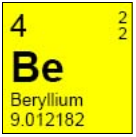Beryllium
View/Download PDF Version
Beryllium
- Beryllium is a steel gray alkaline earth metal found in many minerals. Beryllium is used to increase the strength of several metals, in nuclear reactors, aircraft, and space technology. Potential sources of contamination in drinking water include discharge from metal refineries, coal combustion, electrical, aerospace, and defense industries.
- The USEPA has set a drinking water standard of 0.004 mg/L for beryllium in public drinking water supplies. These regulations do not apply to private water supplies but the health implications are the same for private well owners.
- Beryllium is not readily absorbed by the digestive tract and is excreted rapidly. Intestinal lesions are the primary health effect from beryllium at high concentrations.
- Treatment of water for beryllium can be accomplished with activated alumina, ion exchange, or reverse osmosis.
Additional Resources
Click on the links below to be directed to more resources.
US EPA National Primary Drinking Water Regulations
Water Quality Interpretation Tool
Handbook of Drinking Water Quality; John DeZuane; 1997
